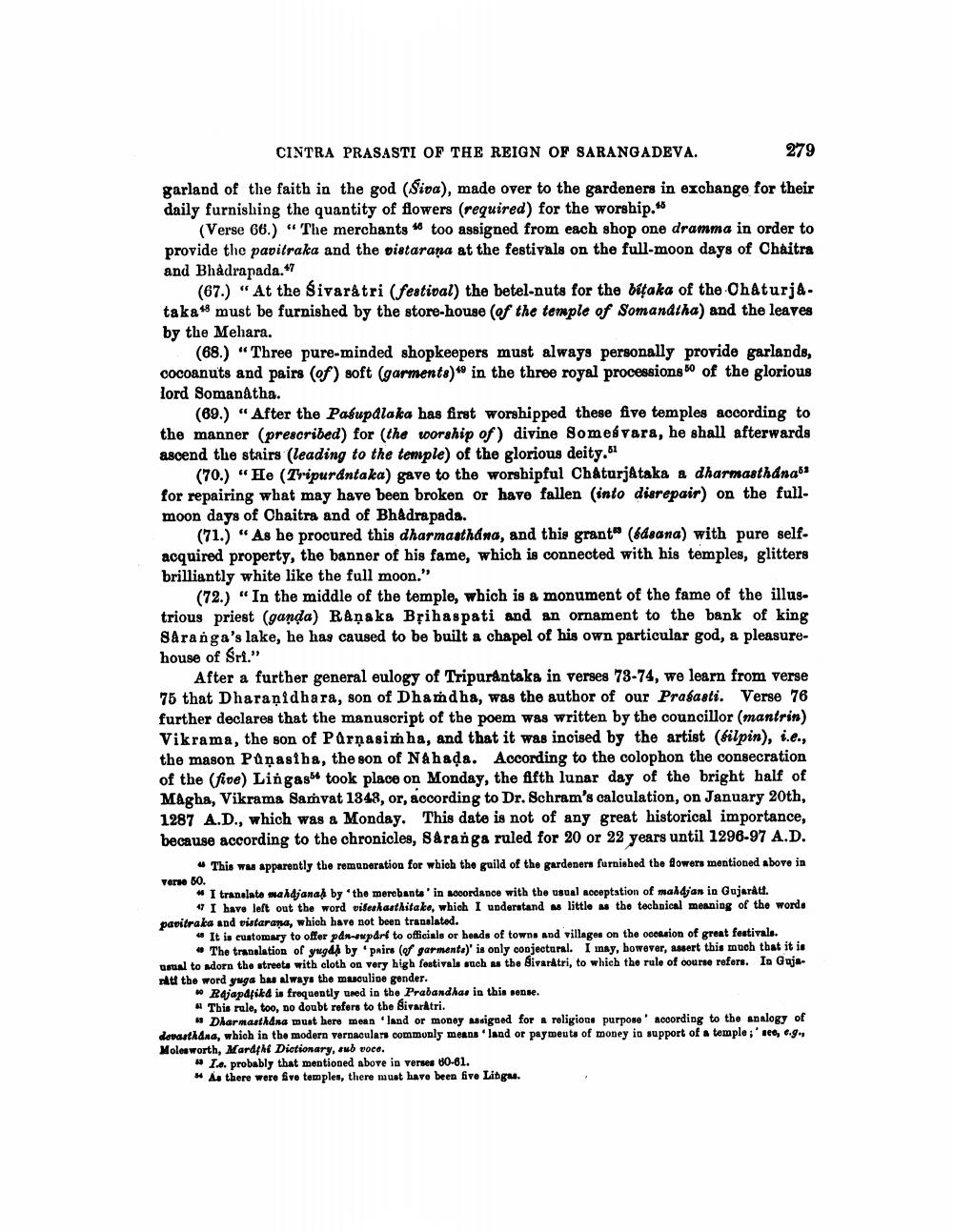________________
CINTRA PRASASTI OF THE REIGN OF SARANG ADEVA.
279
garland of the faith in the god (Sida), made over to the gardeners in exchange for their daily furnishing the quantity of flowers (required) for the worship.*5
(Verse 66.) “The merchants - too assigned from each shop one dramma in order to provide the pavitraka and the pistarana at the festivals on the full-moon days of Chaitra and Bhadrapada."
(67.) “At the Sivaratri (festival) the betel nuts for the bițaka of the Chaturjatakas must be furnished by the store-house (of the temple of Somandlha) and the leaves by the Mehara.
(68.) “Three pure-minded shopkeepers must always personally provide garlands, cocoanuts and pairs (of) soft (garments) in the three royal processions of the glorious lord Somanatha.
(19.) “After the Pasupalaka has first worshipped these five temples according to the manner (prescribed) for the worship of) divine Somesvara, he shall afterwards ascend the stairs (leading to the temple) of the glorious deity.
(70.) "He (Tripurdntaka) gave to the worshipful Chaturjataka e dharmasthanaba for repairing what may have been broken or have fallen (into disrepair) on the fullmoon days of Chaitra and of Bhadrapada.
(71.) “As he procured this dharmastháng, and this grant ($dsana) with pure selfacquired property, the banner of his fame, which is connected with his temples, glitters brilliantly white like the full moon."
(72.) "In the middle of the temple, which is a monument of the fame of the illustrious priest (ganda) Raņaka Bțihaspati and an ornament to the bank of king Saranga's lake, he has caused to be built a chapel of his own particular god, a pleasurehouse of Sri."
After a further general eulogy of Tripurantaka in verses 73-74, we learn from verse 75 that Dharanidhara, son of Dhandha, was the author of our Prasasti. Verse 76 further declares that the manuscript of the poem was written by the councillor (mantrin) Vikrama, the son of Parnasimha, and that it was incised by the artist (bilpin), i.e., the mason Panasiha, the son of Nahada. According to the colophon the consecration of the (five) Lingas took place on Monday, the fifth lunar day of the bright half of Magha, Vikrama Samvat 1848, or, according to Dr. Schram's calculation, on January 20th, 1287 A.D., which was a Monday. This date is not of any great historical importance, because according to the chronicles, Saranga ruled for 20 or 22 years until 1296-97 A.D.
* This was apparently the remuneration for which the guild of the gardeners furnished the flowers mentioned above in Verse 50.
" I translate wahdjanad by the mercbanta in accordance with the usual acceptation of maldjas in Gujarati.
o I have left out the word vifeshasthitake, which I understand m little m the technical meaning of the words pavitraka and vistarana, which have not been translated.
• It is customary to offer pdn-rupdrl to officials or heads of towns and villages on the occasion of great festivals.
• The translation of yugdy by pairs ( garments)' is only conjectural. I may, however, asert this much that it is ural to adorn the streets with cloth on very high festivals such as the Sivaratri, to which the rule of coure refers. In Guja. rith the word yuga bas always the masculine gender.
· RdjapdNkd is frequently used in the Prabandha, in this sense.
This rule, too, no doubt refers to the Sivaratri.
- Dharmarthana munt here mean land or money assigned for religious purpose according to the analogy of devasthana, which in the modern vernaculars commonly means 'land or payments of money in support of a temple;' nec, 6.9 Molesworth, Mardfhi Dictionary, sub voce.
# L... probably that mentioned above in verses 60-61. # As there were five temples, there must have been five Lingas.




